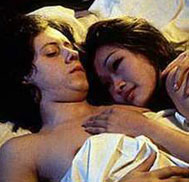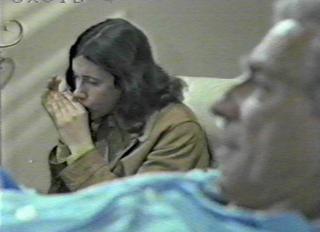 Alice's Restaurant (1969)
Alice's Restaurant (1969)Director: Arthur Penn
I harbor a somewhat jaundiced view of the 1960s. From my point of view, the legacy of that era is decidedly mixed, and I am truly offended whenever someone of a certain age speaks to me with condescension that they "were there" and I wasn't. Of course, that's not exactly true; I was there--just not old enough to participate in the earth-shaking events that shaped the next few decades. Be that as it may, Alice's Restaurant is a window on the 1960s unlike any other film I have ever seen. It's the only film I know of that actually makes me feel sorry that I was too young to be a hippie.
The film is based on Arlo Guthrie's long, narrative song "Alice's Restaurant." The song ranges over the famous garbage incident that landed him and a buddy in a local Massachusetts jail, as well as Arlo's experiences in a military induction center in New York City. The movie recreates the events in the song faithfully, but tacks on other story elements, presumably events related to the script writer and director by Arlo, who stars as himself in the film. (In the interest of full disclosure, I need to tell you that I had a huge crush on Arlo Guthrie, still find him adorable, and that my feelings may color this review a bit.)
The film opens with the bad news that Arlo must report to sign up for the draft that is supplying troops to fight the war in Vietnam. Arlo does what many young men did at that time--he finds a college to enroll in to qualify for a draft deferment. He travels all the way from New York to Montana to find a college, thumbing his way across country as his famous father, populist musician Woody Guthrie, used to do. The long-haired, festively clad Arlo is an uneasy fit in conservative Montana, and he is regularly subjected to taunts by the locals who feel threatened by his appearance. One day, his friend Roger (Geoff Outlaw) comes to visit. Two hippies in town are way too much for the locals. Roger is run off, and Arlo takes a beating at a local diner. He staggers into the street and collapses from the concussion he likely suffered. This is no fist fight from the Old West. One young man is outnumbered, shown no mercy, and felled in a very realistic way. He is immediately thrown out of school.
Arlo decides to visit his friends Ray (James Broderick) and Alice Brock (Pat Quinn) in Stockbridge, Massachusetts. The 40ish couple
 have just purchased a church and set up a commune for their friends and anyone else who decides to drop in. In a rather amusing scene, the priests hold a last service for a handful of congregants, reminding them that God is not attached to any one building, but can be found everywhere. They desanctify the church and file out. Ray and Alice watch expectantly, take the keys from one of the priests, and run through the church like a couple of ecstatics.
have just purchased a church and set up a commune for their friends and anyone else who decides to drop in. In a rather amusing scene, the priests hold a last service for a handful of congregants, reminding them that God is not attached to any one building, but can be found everywhere. They desanctify the church and file out. Ray and Alice watch expectantly, take the keys from one of the priests, and run through the church like a couple of ecstatics.When Arlo shows up shortly thereafter, Alice embraces him in a mighty friendly hug. Alice is an extremely affectionate earth mother to all her charges, many of whom are young, lost teens. Arlo heads down to New York City to play some folk gigs. He is propositioned by a 14-year-old girl, who takes him to a crash pad so that she can notch up another musician. Arlo declines very politely, saying he'd rather not catch her cold. The authenticity of this scene again provides a fuller picture of how these lost youth who became flower children lived and survived.
One young man named Shelly (Michael McClanathan) is being released from Bellevue, where he has been kicking a heroin habit. Ray goes to New York to fetch him. Shelly, a creator of mobiles, wants his art back. Ruth (Eulalie Noble), one of Woody's crowd and now the middle-aged owner of the club where Arlo is playing, offers the money needed to pay Shelly's back rent and give him access to his apartment. Ruth tries to seduce Arlo, who is much less gallant in rejecting her. The casual sex casually sought is a fixture throughout the film.
When Shelly arrives at the church, Alice shows an affection toward him that is uncomfortable for Ray. Jealous, he teases Shelly and pursues sex with Alice more regularly, ringing the church bell, as is the prerogative of the lord and lady of the manor, after each tryst. Shelly's fragile grip on sobriety is tested, particularly after he and Alice have sex, and he gets to feeling jealous himself.
Alice opens her famous restaurant with the construction help of the entire tribe. She's a fabulous cook and manages to attract the locals, who seem to be pretty tolerant of the commune, perhaps because they are good, independent New Englanders. Officer William "Obie"
 Obanhein (playing himself) is fairly passive and accepting of the tribe; Alice has a way of working her charms. His patience is tested, however, the day after Alice and Ray's Thanksgiving feast. Arlo and Roger decide to fill Arlo's VW van--a fixture in the 60s--with the garbage this large celebration generated and take it to the town dump. Unfortunately, the dump is closed. The pair start driving and, spying some debris down an embankment on the side of the road, choose that spot to deposit their load. They are seen in action by an older couple and turned into the police.
Obanhein (playing himself) is fairly passive and accepting of the tribe; Alice has a way of working her charms. His patience is tested, however, the day after Alice and Ray's Thanksgiving feast. Arlo and Roger decide to fill Arlo's VW van--a fixture in the 60s--with the garbage this large celebration generated and take it to the town dump. Unfortunately, the dump is closed. The pair start driving and, spying some debris down an embankment on the side of the road, choose that spot to deposit their load. They are seen in action by an older couple and turned into the police.After a comically exhaustive investigation of the crime scene, Obie does his duty; he arrests the pair and throws them in jail, asking them to remove their belts to prevent suicide and removing their toilet seat to see that they don't bang their heads on it and drown. Arlo and Roger come to trial, plead guilty, and agree to pay a $50 fine and clean up the garbage. This conviction will stand Arlo in good stead when he receives his
 induction notice and must show that he is physically and morally fit to serve in the military. When he is found to have been convicted of a crime, he is asked by a sergeant if he has rehabilitated himself. A quote from the song comes in on voiceover: "Sergeant, you got a lot a damn gall to ask me if I've rehabilitated myself, I mean, I mean, I mean that just, I'm sittin' here on the bench, I mean I'm sittin here on the Group W bench 'cause you want to know if I'm moral enough to join the army, burn women, kids, houses and villages after bein' a litterbug." Arlo is released to the loving arms of his girl, Mari-chan (Tina Chen), whom he met at the Thanksgiving feast only a few days before.
induction notice and must show that he is physically and morally fit to serve in the military. When he is found to have been convicted of a crime, he is asked by a sergeant if he has rehabilitated himself. A quote from the song comes in on voiceover: "Sergeant, you got a lot a damn gall to ask me if I've rehabilitated myself, I mean, I mean, I mean that just, I'm sittin' here on the bench, I mean I'm sittin here on the Group W bench 'cause you want to know if I'm moral enough to join the army, burn women, kids, houses and villages after bein' a litterbug." Arlo is released to the loving arms of his girl, Mari-chan (Tina Chen), whom he met at the Thanksgiving feast only a few days before.What makes this film so unique is its unflinching, but essentially positive view of the story, participants, and era. We see the tragedy of the times--the runaways, drug addicts, painful infidelities, prejudice, and violence. But we also see the love the tribe has for each other and the joy of living an improvisational life. Arlo Guthrie isn't a very good actor, but he is a very good hippie. His fresh, smiling face says so much about why society's misfits were able to come together and create a world of their own that aspired to celebrate the best of what it means to be alive--love, sex, family, caring, a live-and-let-live ethos that abhorred cruelty. A scene during which Joni Mitchell's haunting "Songs to Aging Children," is sung, pays a beautiful and sad tribute to this sweet and doomed community.
James Broderick embodies a man who was born just a little too soon. Ray--not the real Ray, but the movie Ray--seems to me to be a man who was burdened with responsibilities, perhaps as a soldier in the Korean War and a husband in the conformist 50s. His mid-life crisis came at a perfect time, but his emotional and experiential baggage prevented him from truly understanding his newly embraced life. The movie Alice was born to be a hippie. Her backstory could not have been as fraught as Ray's, and her frequent disappointment and uncomprehension of him create a sadness at the core of the joyful family.
 Although Woody's legacy is written all over this film, scenes between a mute and dying Woody (Joseph Boley) and Arlo seem awkward and unhelpful in understanding that legacy. Filming a duet between Arlo and influential folkie Pete Seeger does nothing to correct this weakness. The viewer simply must know that Woody's solidarity and rapport with the Dust Bowl refugees like himself who inhabited the shanty towns of California in the 1930s has its direct mirror in Arlo's life. The respectable Hal Ashby film, Bound for Glory, is recommended viewing to help get a bit of perspective on the life and early times of Woody Guthrie.
Although Woody's legacy is written all over this film, scenes between a mute and dying Woody (Joseph Boley) and Arlo seem awkward and unhelpful in understanding that legacy. Filming a duet between Arlo and influential folkie Pete Seeger does nothing to correct this weakness. The viewer simply must know that Woody's solidarity and rapport with the Dust Bowl refugees like himself who inhabited the shanty towns of California in the 1930s has its direct mirror in Arlo's life. The respectable Hal Ashby film, Bound for Glory, is recommended viewing to help get a bit of perspective on the life and early times of Woody Guthrie.Alice's Restaurant paints an authentic and hopeful picture of a time most have heard about, but few, even those old enough to have been hippies, ever really saw or understood. What the film may lack in structure and style, it more than makes up for in sincerity and understanding. Among Arthur Penn's many examinations of society through individual experience, Alice's Restaurant stands as a unique, near-documentary, achievement. l


0 Comments:
Post a Comment
<< Home